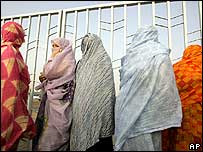
Queues of voters formed early outside polling stations
|
Mauritanians have voted for a new president in the first fully democratic election since independence in 1960.
It marked a final stage of transition to civilian rule after a military coup in 2005. Power has never changed hands at the ballot box in Mauritania before.
There is no clear favourite among the 19 contenders and a second round of voting looks likely.
The coup leader, who is standing down, said the poll marked the moment Mauritanians "come of age".
Colonel Ely Ould Mohamed Vall, whose military council took power in August 2005, said he had a great sense of pride because it was the first time that Mauritanians were choosing their leaders in a free and fair way.
Early estimates suggest a high turnout of about 70%.
 |
PRESIDENTIAL POLL
19 candidates
2,400 polling stations
1.1m voters
300 observers
|
Provisional results are not expected until Monday.
Keeping the military out of power is seen as a key issue for a country which has seen numerous coups and attempted coups since independence from France.
Mauritania seems to have gone further politically in the last two years than it has in the rest of its history, reports the BBC's Richard Hamilton from the capital, Nouakchott.
Col Vall has changed the constitution so that a president can only run for two terms, has improved human rights and brought democracy to this desert country, our correspondent says.
Before the most recent coup, Mauritania spent 21 years under the iron grip of former President Ahmed Taya and elections in those days were regarded as a sham, he reports.
Mauritania is home to a number of different racial groups and many people were expected to vote along ethnic lines.
Candidates include former ministers but no members of the outgoing military government.
Three candidates were tipped to do well:
- Sidi Ould Cheikh Abdellahi - a former minister and economist
- Ahmed Ould Daddah - half-brother of the country's first post-independence leader
- Zeine Ould Zeidane - former central bank governor.
If no candidate wins 50% a second round will be held on 25 March.
Our correspondent says there is a sense of excitement in Nouakchott as no-one knows who will become the next president.
And some voters had still not decided who to support.
"They all make promises and then do nothing. I don't know who to trust, black or white. Only God knows," one woman told Reuters news agency.
Unity
Another key issue is how to unite an ethnically diverse population, which includes Arabs, Berbers and sub-Saharan Africans.
While many presidential hopefuls come from the ruling Arab elite, one candidate represents descendants of slaves.
Despite a ban on slavery in 1980, human rights groups say the phenomenon still exists in the country.
Other major campaign issues have been how to manage the country's new oil reserves and the Islamic republic's decision to recognise Israel.
In February last year, Mauritania started pumping millions of barrels of oil from offshore reserves, though people have still to see any benefits.
In 1999, Mauritania hit the headlines when it became one of only three Arab nations to recognise Israel.
That position was the result of an increasingly close relationship with the United States, which sees the region around Mauritania as a possible breeding-ground for Islamic extremists. That is why the US will be watching the poll closely.